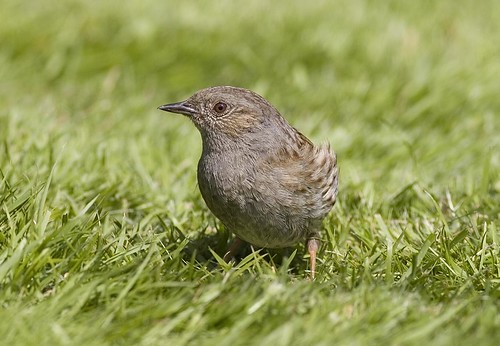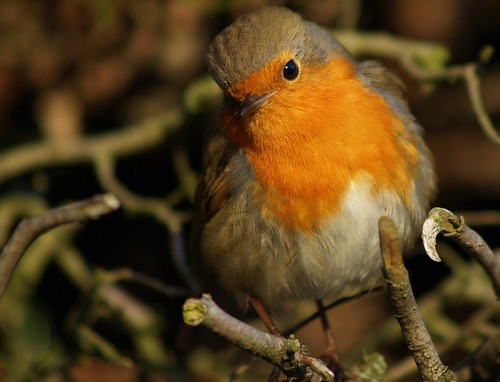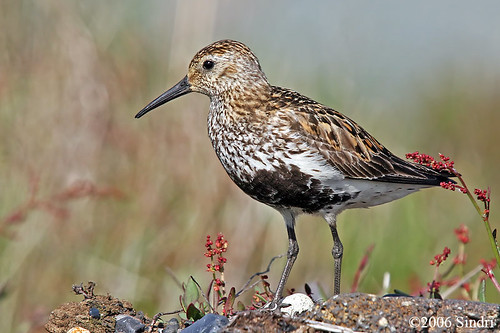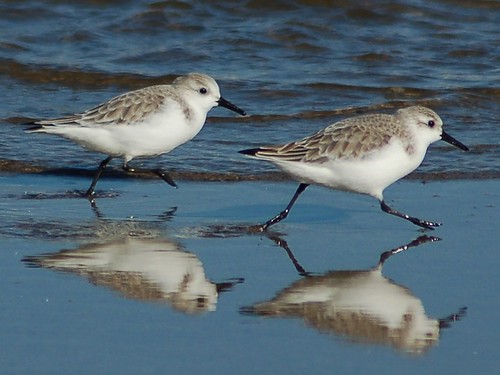I was watching a dunnock in the garden earlier

and it suddenly occured to me that there might be a parallel between the word ‘dunnock’ and ‘ruddock’ – the old name for a robin.

And having got that far, I thought maybe ‘dunnock’ derived from ‘dun cock’ and ‘ruddock’ from ‘ruddy cock’. So I got out the dictionary. Turns out I was part right.
dunnock (‘dʌnək). [app. f. dun a. + -ock dim. suffix; from the dusky brown colour of the plumage. Cf. dunlin.]
In other words, ‘dunnock’ pretty much translates as that classic birder’s term, LBJ — Little Brown Job [btw, while I was looking for dunnock photos on Flickr, I discovered that the Dutch for dunnock is ‘heggemus’ — presumably ‘hedge mouse’. But let’s stick to one language at a time].
The reference to ‘dunlin’ intrigued me.

And at dunlin I learnt that it’s f. dun a. + -ling. ‘ling’ is a familiar diminutive suffix of course; ‘darling’ and ‘duckling’ are the most obvious examples. But there’s another small sandpiper called a sanderling, and I was curious how that fitted in.

Well, pleasingly, the OED’s best guess for the origin of sanderling is the Old English sand-yrðling; i.e. ‘sand-earthling’. Not as in ‘take me to your leader’; ‘earthling’ meant ‘ploughman’. Ploughman of the sand.
Getting back to my -ock birds. I looked up ‘ruddock’, and sure enough it says
ruddock (‘rʌdək). [OE rudduc, related to rud sb., ruddy a. : see -ock.]
I also learned that a ruddleman is a digger of, or dealer in, ruddle; a raddleman. But that’s not important right now. Seeing ‘rud’ written as a word helped me make the connection that ‘ruddy’ is cognate with ‘red’. Which probably should have been obvious but I never thought about it. There was one last entry that needed to be checked out. It has such a load of great words in it I’m going to type it out in full.
-ock, suffix, forming diminutives. A few examples of dimin. –oc, –uc, occur in OE., as bealloc ballock, bulluc bullock. In mod. Eng., the chief instance of the dim. suffix is hillock (found already in Wyclif); but other examples occur in the dialects, esp in Sc., e.g. bittock, lassock, queock or queyock, whilock, wyfock, also proper names as Bessock, Jamock, Kittock. Several names of animals, esp. birds and fishes, have the same ending and are prob. orig. diminutive; among these are OE. cranoc, cornoc (dim. of cran), crane; ruddoc (read red) redbreast, ruddock; cf. the modern (some ME.) dunnock, haddock, girrock, paddock, piddock, pinnock, pollock, puttock; also, as names of things, buttock, hattock, tussock. In other words (some of which, as bannock, hassock, mattock, go back to OE.) -ock appears to be of different origin.
The actual word ‘robin’, btw, is from the habit, going back at least as far as the middle ages, of applying personal names to birds: Robin Redbreast, Jack Daw, Mag Pie. ‘Magpie’ is especially apt because ‘mag’ was used to mean ‘chat’, ‘chatterbox’, or ‘to chatter’. ‘Mag’s tales’ were what we would call ‘old wives’ tales’.
NB. The pictures are all from Flickr and © the people who took them; you can click through to the page on Flickr. The dictionary extracts are all from the OED.




